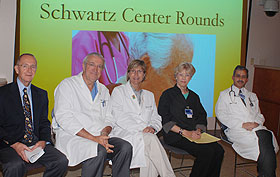  |
| HOME | THIS ISSUE | CALENDAR | GRANTS | BACK ISSUES | < BACK | NEXT > |
Group discussions help care-givers cope with challenging casesby Kristina Goodnough - October 1, 2007 | ||||
| Once a month, a diverse group of care-givers at John Dempsey Hospital gather to share their feelings about difficult or troubling situations involving patients. The gatherings are designed not to solve problems or to talk about quality improvement, but to give the care-givers an opportunity to share their feelings and gain some perspective on particularly challenging cases. The conversations, open to doctors, nurses, social workers, and other staff, are called Schwartz Rounds, after Kenneth Schwartz, who established the Schwartz Center at Massachusetts General Hospital to strengthen the relationship between patients and care-givers. Topics discussed during Schwartz Rounds can include how to tell a patient that it may be time to stop treatment; caring for a colleague; cultural and religious beliefs that may interfere with the ability to communicate; medical mistakes; children dealing with the death of a parent; and dealing with spiritual crises with patients. Currently, Schwartz Center Rounds take place at more than 120 hospitals in 26 states. “I heard about the Schwartz Rounds from a physician in another hospital,” says Audrey Chapman, the Joseph M. Healey Jr. Chair in Medical Humanities and Bioethics, who initiated the process to bring Schwartz Rounds to the Health Center. As part of the application process, Chapman traveled to Mass General in Boston to observe Schwartz Rounds. She was accompanied by Dr. Joseph Civetta, co-chairman of a Pain and Palliative Care Group at the Health Center; Nancy Baccaro, nurse practitioner in palliative care and pain in the Neag Cancer Center; and Patricia Verde, director of social work. They were so impressed by what they saw that they moved quickly to introduce them at the Health Center. “We want to talk about the things we think about when we’re driving home after a particularly hard day or after a particularly difficult discussion with a patient’s family,” says Civetta, leader of the Schwartz Rounds planning committee. “The goal of Schwartz Rounds is to help care-givers feel better, and to learn from colleagues in an informal setting how to handle situations better. First and foremost, you realize you are not alone. You lessen barriers to effective communication, and you may learn language that will help you handle difficult situations in the future.”
During the rounds, a patient’s case is presented briefly by the attending physician. Other members of the care-giving team provide additional aspects of the case. Discussion then begins. “Members of a multidisciplinary team caring for a patient each have their own mission,” says Elizabeth Taylor-Huey, director of community education for the psychiatry department and facilitator for the Schwartz Rounds. “Sometimes there are conflicts among team members about appropriate steps or about the patient’s needs. “This is an opportunity to discuss social and emotional aspects of patient care with members of different disciplines,” she says. Baccaro says, “Care-giving is difficult today because of mandates from many organizations, business constraints, technology changes, and even our success in helping people live much longer. Care-givers who focus on the needs of patients and families also need to be able debrief or empathize with each other.” Sometimes, family members don’t have the same expectations about care and treatment as patients do. For example, a patient may want to end treatment, while family members may not be ready to accept that decision. Sometimes, a patient’s children have to be involved in care decisions because they are the only relatives, but if the children are not 18 or older, care-givers may be uncomfortable discussing painful issues with them. “Care-givers can feel like they are caught in the middle,” says Baccaro. Adds Taylor-Huey, “Difficult or emotional cases can trigger strong feelings among care-givers. Schwartz Rounds are designed to give them a safe place to discuss those feelings.” |
| ADVANCE HOME UCONN HOME |

